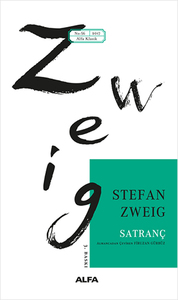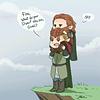Take a photo of a barcode or cover
informative
reflective
sad
slow-paced
Plot or Character Driven:
Character
Strong character development:
Yes
Loveable characters:
No
Diverse cast of characters:
No
Flaws of characters a main focus:
Yes
fast-paced
dark
emotional
reflective
tense
fast-paced
emotional
tense
fast-paced
Plot or Character Driven:
Character
Strong character development:
Complicated
Loveable characters:
Yes
Diverse cast of characters:
No
Flaws of characters a main focus:
Yes
mysterious
reflective
fast-paced
Plot or Character Driven:
A mix
Strong character development:
Complicated
Loveable characters:
Complicated
Diverse cast of characters:
Yes
Flaws of characters a main focus:
Yes
Chess Story is an excellently written novella by Stefan Zweig about a chess game containing psychological depth and a twist.
lighthearted
fast-paced
Plot or Character Driven:
Plot
Strong character development:
No
Loveable characters:
Yes
Diverse cast of characters:
No
Flaws of characters a main focus:
Complicated
What a gripping read this was! I was engaged throughout; from the introduction by Peter Gay all the way to the last page (a rather bitter end). Zweig is a masterful storyteller who used a third-party narrator to draw out everything through interactions and conversations. The characters were all very charming and I was invested in their stories, wanting to hear more from them even after the end of this novella.
The two main characters are uniquely different chess players; a prodigy coming from a humble background with an even more humble intellectuality that no doubt confines his chess play, juxtaposed against a former-very-important intellectual who learned chess purely through mental simulation. They both have distinct personalities and striking flaws as characters but their stories are so believable and interesting, and I rooted for both of them as they are both underdogs in their own way.
In retrospect, with the entire first part of the story dedicated to Czentovic, it was rather disappointing that his portrayal did not seem consistent towards the end. Czentovic is described as unable to speak properly for interviews and incapable of visualising the chess board in his mind, and yet he speaks alright and this major limitation does not unfold as I would have wanted to see at the final chess match. In fact, he is amounted to a mere, rather cunning, villain against Dr B’s pyschological breakdown. It really feels like a missed opportunity.
However, upon pondering on the possible symbolic embodiment of Czentovic as Nazism, the loopholes of the story no longer seem to matter as much. The intense and futile struggle against fascism may well be a reflection of how Zweig felt as he was driven to suicide. And Zweig’s focus may have been to shed light on the effects of psychological trauma. What made this novella so powerful is how, like Animal Farm but much more subtle (and personally a bit weaker), it could be a fun story to read but also representative of something much more.
The two main characters are uniquely different chess players; a prodigy coming from a humble background with an even more humble intellectuality that no doubt confines his chess play, juxtaposed against a former-very-important intellectual who learned chess purely through mental simulation. They both have distinct personalities and striking flaws as characters but their stories are so believable and interesting, and I rooted for both of them as they are both underdogs in their own way.
In retrospect, with the entire first part of the story dedicated to Czentovic, it was rather disappointing that his portrayal did not seem consistent towards the end. Czentovic is described as unable to speak properly for interviews and incapable of visualising the chess board in his mind, and yet he speaks alright and this major limitation does not unfold as I would have wanted to see at the final chess match. In fact, he is amounted to a mere, rather cunning, villain against Dr B’s pyschological breakdown. It really feels like a missed opportunity.
However, upon pondering on the possible symbolic embodiment of Czentovic as Nazism, the loopholes of the story no longer seem to matter as much. The intense and futile struggle against fascism may well be a reflection of how Zweig felt as he was driven to suicide. And Zweig’s focus may have been to shed light on the effects of psychological trauma. What made this novella so powerful is how, like Animal Farm but much more subtle (and personally a bit weaker), it could be a fun story to read but also representative of something much more.
adventurous
dark
tense
medium-paced
Plot or Character Driven:
Character
Strong character development:
Complicated
Loveable characters:
Complicated
Diverse cast of characters:
No
Flaws of characters a main focus:
Complicated
4.35
kinda thought dr b story was dragging but whole chess games thing was really exciting and wished there was more
kinda thought dr b story was dragging but whole chess games thing was really exciting and wished there was more
Moderate: Torture
challenging
dark
mysterious
reflective
tense
fast-paced
Plot or Character Driven:
Character
Strong character development:
Complicated
Loveable characters:
No
Diverse cast of characters:
No
Flaws of characters a main focus:
Yes
“Nada se nos hizo, sólo que se nos situó dentro de la nada absoluta, porque, según es notorio, ninguna cosa del mundo ejerce tanta presión sobre el alma humana como la nada.”
Mi tercer Zweig, su última novela. Este hombre fue un genio. Retratar la angustia y el sufrimiento en menos de cien páginas y con una partida de ajedrez por el medio no debe de ser fácil pero él consigue que lo parezca.
Mi tercer Zweig, su última novela. Este hombre fue un genio. Retratar la angustia y el sufrimiento en menos de cien páginas y con una partida de ajedrez por el medio no debe de ser fácil pero él consigue que lo parezca.
reflective
slow-paced
Plot or Character Driven:
A mix
Strong character development:
N/A
Loveable characters:
N/A
Diverse cast of characters:
N/A
Flaws of characters a main focus:
Complicated





